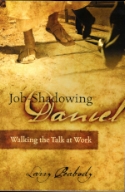Watch Your Language: Part Two
The previous blog explored how the clergy-laity divide works against shared church. In Part Two, we’ll look at how misuse of the word ministry has a similar effect.
“When words shrink, people get smaller,” wrote musical composer Paul Crabtree.
Among us Christians, the withering of the word ministry has done just that to people. Originally, any Christ-follower could engage in ministry. But the term has undergone something like what happens when you drag the corners of a computer image to resize it. What began as large-box ministry has become small-box ministry.
Diakonia. That’s the Greek word usually translated into English as ministry. One Greek-English dictionary says it means “the role or position of serving” or “a procedure for taking care of the needs of people.” Most legitimate work, paid or unpaid, serves and cares for the needs of others. “Work is the form in which we make ourselves useful to others,” says Lester DeKoster in Work: The Meaning of Your Life.
Enter Ministry-Lite
But in today’s church circles, the ministry has narrowed to mean work such as serving as a pastor or missionary. It’s easy to find examples online:
- “Five Signs You’re Meant to Enter the Ministry”
- “Should You Enter the Ministry?”
- “He left the ministry to follow business opportunities.”
- “She . . . left the ministry to pursue a writing career.”
It seems, then, that the resized ministry has come to resemble a room with a swinging door. You may enter it today and leave it tomorrow. Which raises serious questions. If you, as a mature believer, enter the ministry, what were you doing before that? And if you leave the ministry, does that mean you have now entered “non-ministry”?
What if you switch back and forth? A friend of mine asked an acquaintance, “You’re retired, aren’t you?” The reply: "I’m still working part time with a parachurch, international students’ organization. We recently spent a year where many of these students had come from. So we taught them English for 20-30 hours a week. The rest of the time we did ministry.” Was this person stuck inside a revolving-door: entering-leaving-entering-leaving? Did Paul rotate in and out of ministry, making tents now, doing ministry then?
Those words, “entering” and “leaving,” show that the ministry has been professionalized. Lawyers and doctors may enter or leave their professional careers. But as Os Guinness points out in The Call: “There is not a single instance in the New Testament of God’s special call to anyone into a paid occupation or into the role of a religious professional.”
Does the Small-Box Ministry Issue Matter?
Yes. First, because the resized word works against shared church. It tends to supersize those in the ministry. This only increases the distance between “clergy” and “laity.” Pedestals do not promote healthy one-anothering.
Second, small-box ministry lets far too many Christians slip, so to speak, off the hook. It is easy to justify not laying down our lives in service for others by thinking, “But I’m not in the ministry.” Shared-church means every-member ministry. No one called by God gets a pass on serving him and others full time.
Third, countless Christians who wholeheartedly desire to serve the Lord in their work, get the strong impression—some are even taught—that this means they ought to “enter full-time ministry.” This is, they are often led to believe, a "higher calling." Far too many learn too late that God has not wired them to be pastors or missionaries. Some even end up needing the help of a psychiatrist or counselor.
Can We Find More Accurate Words?
Why do we continue to describe only the work of pastors and missionaries as the ministry? Do we lack the language to express the true situation? To find better ways of saying what we mean, it will help to keep a couple of truths firmly in mind:
- The church operates in two modes—gathered and scattered. Neither outranks the other. Each needs the other. Some have compared the rhythm to the body’s circulatory system. Blood gathers in the heart and lungs to be replenished, then scatters to the extremities to deliver life-giving oxygen and nutrients. Practicing shared church requires that we recognize both church gathered and church scattered and to give each its rightful place.
- God has called all of us to serve him and others—to minister—both with our words and our works. Many Scriptures emphasize both kinds of serving. For example, “And whatever you do, whether in word or deed [literally, work], do it all in the name of the Lord Jesus, giving thanks to God the Father through him” (Col. 3:17). The word-to-work proportion varies from member to member within the Body of Christ. Some are more word-focused. Some more work-focused. But each of us should engage in both.
With these gathered/scattered and word/work truths before us, perhaps we can discover new ways of speaking without falling back into the small-box-ministry language. Instead of saying, “He entered full-time ministry,” perhaps say something like, “He now serves as a shepherd in the gathered church.” Instead of saying, “She did not enter the ministry,” say something like, “She serves as a social worker in the scattered church.”
“Words are powerful; take them seriously” (Matt. 12:36, The Message).


